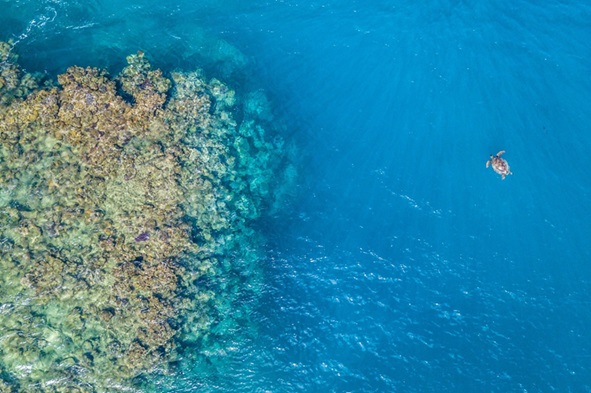Ghana leads way in sustainable ocean management in West Africa

By Catherine Adodoadji-Dogbe
The ocean covers over 70% of our planet and plays a vital role regulating the climate and providing food, accounting for almost 16% of all animal protein consumed globally.
Despite its importance, the ocean faces numerous threats, including illegal fishing, plastic pollution, and climate change. This year’s World Oceans Day themed, “Awaken New Depths” calls for deeper understanding, compassion, collaboration, and commitment to protecting the ocean.
Ghana with its 550 kilometers (km) coastline, relies heavily on the fisheries sector which employs about 20% of the labor force. However, illegal, unreported and unregulated (IUU) fishing, plastic pollution, and climate change threaten the balance of the ocean’s ecosystems and strain marine resources.
To address these challenges, Ghana has taken significant steps. As a member of the High-Level Panel for a Sustainable Ocean Economy, Ghana has committed to sustainably manage 100% of the ocean area under its national jurisdiction by 2025. The country is developing a Sustainable Ocean Plan (SOP) to implement the Ocean Panel’s transformations agenda.
Additionally, Ghana held its first National Blue Economy Summit, supported by UNDP Ghana and other partners, to raise national awareness about the importance of ocean action for achieving the Sustainable Development Goals (SDGs) and engaged key stakeholders to mobilize action for sustainable management national waters.
While these initiatives are commendable, further efforts are needed to create widespread momentum for ocean management.
Awakening depths of understanding
Data access and availability fosters deeper insight into issues, facilitates monitoring including trend analysis, and supports evidenced-based policymaking for enhanced governance and sustainable management of natural resources, including oceans. New challenges such as climate change, loss of biodiversity, pollution and extractive activities require robust and reliable scientific research.
UNDP Ghana in partnership with the Institute for Environment and Sanitation Studies, and the Department of Marine and Fisheries Sciences of the University of Ghana conducted research to illuminate the emerging threat of microplastics tiny plastic particles infiltrating global marine ecosystems, including Ghana’s. These pollutants pose significant risks to marine life and human health.
Beyond research, robust data collection, processing and knowledge management are key to unlocking a deeper understanding of the ocean system. By advancing scientific research and enhancing access to reliable, simplified and useful data, governments and other key actors can increase public awareness and develop effective strategies to improve the ocean management and conservation.
Awakening depths of collaboration
A collaborative, whole-of-society approach encompassing academia, policymakers, the private sector and non-governmental institutions (NGOs) is critical in developing innovative solutions to protect the ocean and ensure its health for future generations. UNDP’s Waste Recovery Platform provides a multi-stakeholder platform for waste recovery exchange and solutions. This Platform connects key stakeholders in the waste management value chain to promote waste recovery in a larger circular economy context. Through collaborative efforts, platform members have organized beach clean-up campaigns, developed educational materials, and raised awareness about plastic pollution in our oceans, aiming to influence positive behavioral changes to protect the marine environment.
In Ghana, the National Plastic Action Partnership also provides a platform for muti-stakeholder collaboration to address plastic waste and pollution. Beyond national borders, regional and international collaborations are equally important. They promote knowledge exchange and technology transfer essential for the effective protection, conservation, and sustainable development of marine and coastal environments.
Awakening depths of commitments
Achieving a healthy and sustainable ocean demands not only deeper understanding and collaboration but also a significant increase in commitments. Governments, private sector, donors including philanthropists, academia and civil society organizations (CSOs) can showcase an awakened depth of commitment by increasing financial commitment to support ocean conservation and research.
Financial commitments can be increased by creating awareness of the opportunities and impact of investing in the ocean. Governments can create an enabling environment by reforming policies related to taxes, subsidies, and regulations to attract industry and capital towards sustainable ocean investments. Additionally, Multilateral Development Banks can provide guarantees to help de-risk investments for new technologies. They can also leverage blended financing to unlock private sector funding to support the development and deployment of innovative ocean technologies.
As the world embarks on awakening the depths of understanding through improved research and data, depths of collaboration through partnerships at the local, regional and international level, and depths of commitment through increased financing, governments and actors in the ocean governance space, will chart a course towards a healthier, more sustainable future for the world’s Oceans, moving closer to achieving SDG 14.
The writer is a Programme Analyst with the UNDP , Ghana




